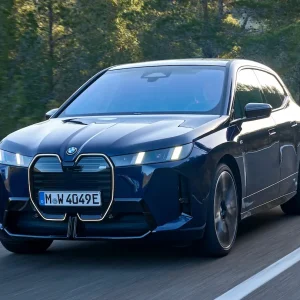Lexus has moved itself to the sharp end of the executive segment by introducing to its GS range a new model capable of 109g/km, undercutting all in the sector bar Mercedes’ hybrid E-class, which also emits 109g/km.
The petrol-electric hybrid GS offers 223hp by combining a 2.5-litre petrol engine with an electric motor, and it will run for short periods on battery alone. It is worth noting, though, that CO2 rises to 113g/km for all bar the entry SE, which is £6000 cheaper than the next trim level up, yet isn’t badly specced at all and provides an appealing new price entry point for the GS range.
Lexus has targeted the GS300h in price and power terms at 2.0-litre diesel rivals, but the hybrid has a BIK advantage as it’s both more efficient than the best executive diesel saloon – BMW’s manual 520d at 119g/km – and doesn’t have the three-band penalty diesels still suffer on BIK.
And that’s before you factor in that the GS300h is an automatic, and BMW’s 525d, the most efficient regular diesel auto, comes in at 128g/km. (According to Lexus, more than three-quarters of buyers go for an auto with their executive car.)
For whole-life costs, only the Mercedes E300 hybrid gets within a penny per mile of the GS300h’s 76.3p, with the nearest diesel auto executive saloon being Jaguar’s XF 2.2 Premium Luxury at 79.5p, and the BMW 520d Luxury auto at 79.9p. A 40% tax payer will save £96 per month with a GS300h Luxury, compared with an auto BMW 520d saloon Luxury spec model.
To drive, the GS can’t match the German saloons or the XF in terms of handling, but it’s safe enough and isn’t embarrassed in that company. The issue is the powertrain’s combination of noise and delivery, in that, certainly in our test car, a prod of the accelerator brings a rise in volume that’s eventually followed after too long a wait by some improved urge.
Boot space is also at a premium, with the hybrid powertrain gobbling luggage room. While nowhere near as bad as the previous GS model, there’s still 69 litres less than a 5-series.
| Lexus GS300h | |
| P11D price | £37,440 |
| Model price range | £31,440-£43,695 |
| Residual value | 33.8% |
| Depreciation | £24,797 |
| Fuel | £6187 |
| Service, Maintenance and Repair | £2822 |
| Vehicle Excise Duty | £40 |
| National Insurance | £2377 |
| Cost per mile | 76.3p |
| Fuel consumption | 57.6mpg |
| CO2 (tax) | 113g/km (14%) |
| BIK 20/40% per month | £87/£175 |
| Service interval | 10,000mls |
| Insurance (1-50) | group 32 |
| Warranty | 3yrs/60,000mls |
| Boot space | 451 litres |
| Engine size/power | 2494cc/223hp |
| Top speed/0-62mph | 119mph/9.2secs |





